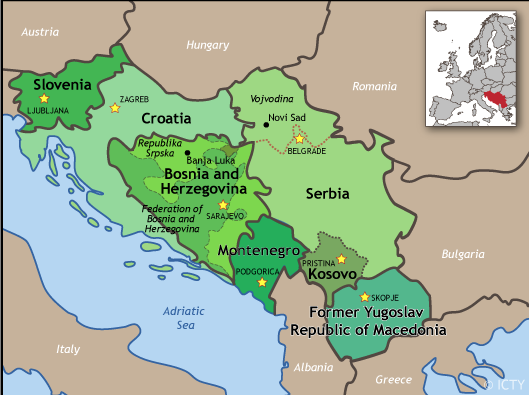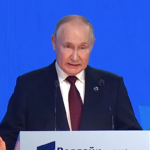In the Middle East we have – as usual – more and more of the same. Regardless of how old you may be, from time to time you will have heard about clashes, assaults, wars, conflicts – you name it – between Israel and the rest of the Arab – Muslim – world happening there incessantly. On and on and on. Since 1948, since the year when the state of Israel was founded. Even people who are not conversant with politics will have heard about Hamas or Hezbollah, about the Six-Day War (of 1967), about the Gaza Strip, the Golan Heights or the West Bank (of the Jordan), about PLA (the Palestinian Liberation Army) or the Yom Kippur War (of 1973), or, or, or. You may not be able to say much about the events or people or places – where the heck is Jordan or Syria or Lebanon – but you will have heard about all of them, so that by now you will have doubtless associated the Middle East with a forever war interspersed with longer or shorter periods of ceasefire. The events of the 7th of October and the following retaliatory measures are yet another (latest but by no means last!) link in this never-ending chain of clashes.
Now why have we all been hearing about the ongoing, never-ending, incessant conflict between Israel and the rest of the Arab world, especially between Israel and Palestinians for these more than 70 years?
The state of Israel, as you may know, was established in 1948. Its creation was brought about by no less an international organization than the United Nations (an organization that unites sovereign political entities – countries, states – but, by Lord, not nations as such, but never mind the detail). The genesis (Genesis!) of Israel could not have been more legitimate, could it? The point is that the same United Nations Organization stipulated that also a Palestinian state was to be created along with the state of Israel. Now more than seventy years have passed and although we have had the state of Israel for these more than seventy years, the Palestinian state is nowhere to be seen. Supposedly American presidents have always wanted to have both Israel and Palestine as sovereign countries in the Middle East. Supposedly, because somehow the United States has never been able to convince, persuade, compel Israel to recognize Palestine as a separate, independent political entity, and to release the Palestinian lands that Israel has grabbed. How is that possible that the UN resolution was implemented half-way only? How is it possible that the big United States has not been able to make the small Jewish state comply with the ruling of the United Nations? Especially, if you consider that the ruling of the United Nations overlaps with Washington’s interests in the Middle East because these interests are STABILITY. You may say that the United States is no international bully and respects the sovereignty of even the smallest of states, so if Tel Aviv has for all these years refused to comply, the Hill has been helpless.
The claim that the United States has not been able to persuade or compel Israel to comply with the United Nations’ decision because Washington respects the sovereignty of even small states is – yes – laughable. Of the numerous examples showing unequivocally how the United States has enforced its will on other nations, let us choose Yugoslavia. What Israel is to Lebanon, Syria, Jordan, Palestine and Egypt so was Serbia to Croatia, Bosnia, Slovenia, Macedonia and Albanians in Kosovo. They all wanted to become independent of Belgrade, so – stepwise – they broke away from the Socialist Federal Republic of Yugoslavia and they were assisted in it by the United States. Whenever Serbia wanted to keep a republic inside the fold or claimed small pieces of a break-away republic’s territory, the United States would step in and by hook or by crook force Serbia to comply with “international” dictates. It did not take the United States seventy years to make the former Yugoslavian republic obey “international law”.
The comparison is even more to the point if we set our sights on Kosovo because Albanians in Kosovo invite a comparison with Palestinians in Gaza and the West Bank. Just as Serbia views its territory as comprising Kosovo with little regard for the fact that it is predominantly inhabited by Albanians, so, too, Tel Aviv would like to view Gaza and the West Bank as part of (the Greater) Israel with little regard that these territories are inhabited by Palestinians. Somehow, in the former case Washington (and America’s client states) was efficient in tearing Kosovo away from Serbia and establishing there a state that is recognized by a large number of countries. How much time did it take? A couple of years? Somehow, the same solution in reference to Palestine (i.e. Gaza and the West Bank) is hard to implement by the same United States, which is so efficient elsewhere in the world. Why? Is it because the Israelis don’t want such a solution and they have influential friends on the Potomac?
Why what was possible and relatively easy to enforce as a many-state solution in Yugoslavia (which was broken up into 1 Slovenia, 2 Croatia, 3 Bosnia and Herzegovina, 4 Serbia proper, 5 Republika Srpska, 6 Macedonia, 7 Montenegro, 8 Brčko District (look it up!) and 9 Kosovo) cannot be enforced in the Middle East? If we can have such a bizarre solution like that of having the sovereign state of Serbia (outside Bosnia and Herzegovina), the sovereign state of Bosnia and Herzegovina and that of Republika Srpska (not to be confused with Serbia proper!) inside Bosnia and Herzegovina (did you know about it?), why can’t we have a Palestinian state straddling Israel with its one part located in the West Bank and the other in Gaza? If we can have Brčko District, why can’t we have the City of Jerusalem turned into something similar i.e. a “self-governing administrative unit with a special status reflecting the multi-ethnic nature of the region” to quote Wikipedia’s words?
The Hamas attacks from October 7, 2023 and the ongoing war keep reminding politicians across the board about the necessity of creating a Palestinian state, but we may be sure that nothing whatsoever will be done, just as it has not be done for over seventy years.
It’s even worse than that. During the many fratricidal fights in the former Yugoslavia, the West (read: the United States) was quick to spot war crimes and to hold the “guilty” accountable for them by putting many (mainly Serbian) political and military leaders on trial. Why nothing of the kind is happening now or has been happening for the many years of the conflict between Palestinians and Israelis? It is somehow hard to imagine that Serbs committed many war crimes against Albanians (and Croats) within a few years whereas Israelis have not committed any atrocities within more than seventy years! It looks like Serbs had to be intimidated by show trials while Israelis do not.
No wonder then that if nations of the world see this partisan approach in the Middle East (and elsewhere), they resort to arms rather than to international organizations, and (like Palestinians nowadays) they prefer to fight rather than talk.























